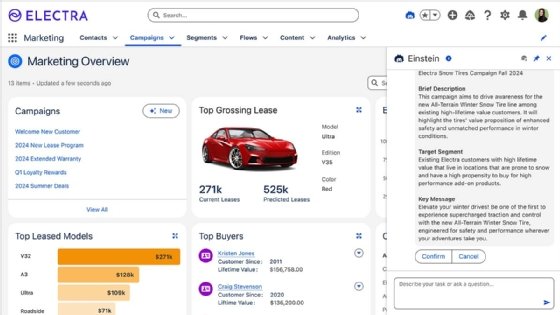
Getty Images/iStockphoto
Salesforce reveals more on Agentforce autonomous AI agents
Salesforce seizes on the concept of agentic AI to automate sales and service processes. The company holds fast to the idea the AI agents will assist humans -- not replace them.
Agentforce, a platform of autonomous bots for service, sales, e-commerce and marketing, is coming to Salesforce.
The company's Thursday reveal event was led by CEO Marc Benioff, who typically waits until the Dreamforce keynote to address users.
Two versions of Agentforce Agents exist. The first, which most Salesforce customers will use, will release October 25. A second version, codenamed Atlas, uses a proprietary reasoning engine to make decisions. It will launch in February 2025. Both will be able to create agents with no code and natural language prompts piped through generative AI.
Salesforce hopes to convince users that its autonomous agents are a step up from traditional chatbots. They will be able to execute tasks with agentic AI empowered to take actions and better understand natural language queries than existing rules-based bots.
One example of this was demonstrated by Patrick Stokes, Salesforce executive vice president of product and industries marketing. During the demo, he phoned Sophie, a mockup of a Saks Fifth Avenue Agentforce agent, to return a sweater. He then showed how Salesforce users can tap generative AI to create and edit the actions an autonomous service bot could take, such as directing a replacement sweater to be shipped to a store or mailed.
Salesforce is betting the house on Agentforce, Forrester Research analyst Kate Leggett said. But the company is not alone in its pursuit of autonomous AI to make both customer and employee experience more efficient.
"All vendors are talking about AI agents -- Oracle at CloudWorld this week and ServiceNow in the recent Xanadu release," Leggett said. "Salesforce makes AI agents approachable by humanizing them and giving them a discrete job to be done. They will impact work [positively], but AI adoption has lagged."

It wasn't built overnight
Agentforce is the culmination of years of Salesforce building foundational technologies, such as Einstein 1 and Data Cloud, Constellation Research analyst Liz Miller said.
"This is a victory lap after years of doing the unsexy sausage-making," Miller said, adding that Benioff and Salesforce senior leadership likely were present to debut it because they are "keenly aware" that customers are looking for returns after years of AI investments.
Agentforce agents will comprise five components, according to Clara Shih, Salesforce AI CEO:
- Defining a role the agent will perform, such as sales rep or service agent.
- Setting rules for data the agent may access.
- Establishing what actions they can take.
- Implementing guardrails to define what they aren't allowed to do.
- Dictating what channels they are allowed to work on.
"I've never worked on anything more exciting," said Benioff, who set a companywide goal to enable users to activate a billion Agentforce autonomous agents by the end of 2025. "This isn't just a bolt-on copilot, which has been such a terrible experience for our customers. We're not asking them to DIY it. We [want to] take normal people and make them great AI people. That is our dream."
Salesforce has long claimed that AI needs a human in the loop. Benioff said earlier this year that artificial general intelligence has the potential to lead to a monumental disaster. To that end, Shih said there will be controls on Agentforce agents. One example of this is an upgraded Omni Supervisor, a monitoring tool for Service Cloud users that currently enables managers to monitor human agents and insert chats into an agent's view that only they can see during a customer call.
While few details regarding pricing have been revealed, Benioff said Salesforce was targeting $2 per conversation as a starting price point, with volume discounts to be offered.
Don Fluckinger is a senior news writer for TechTarget Editorial. He covers customer experience, digital experience management and end-user computing. Got a tip? Email him.






